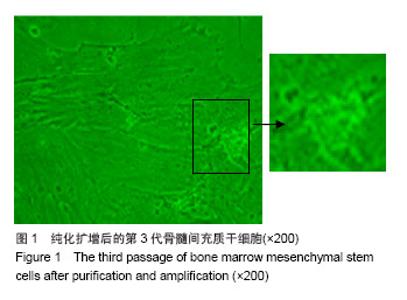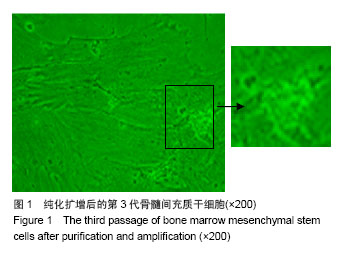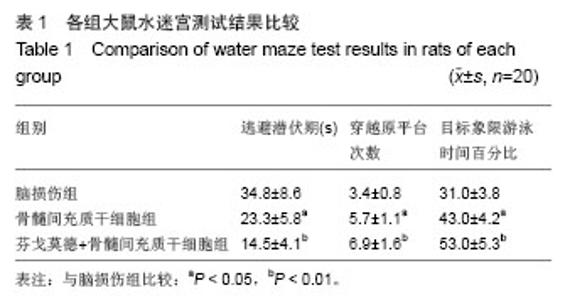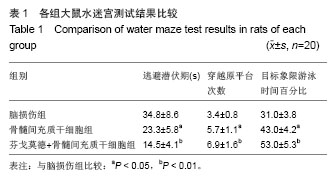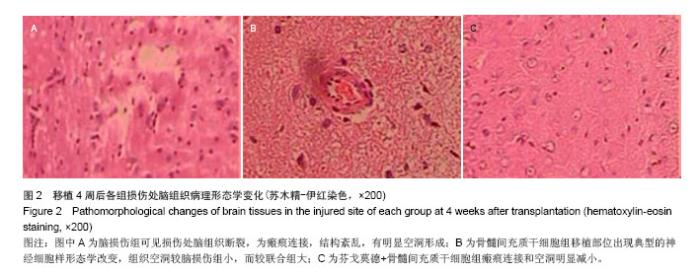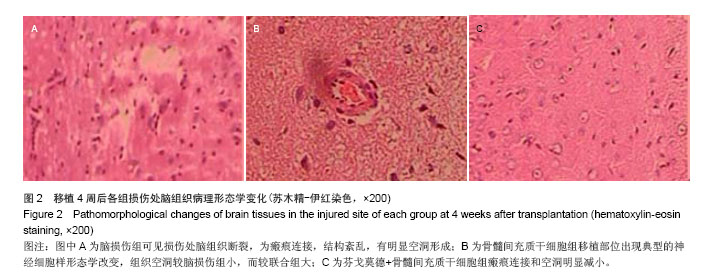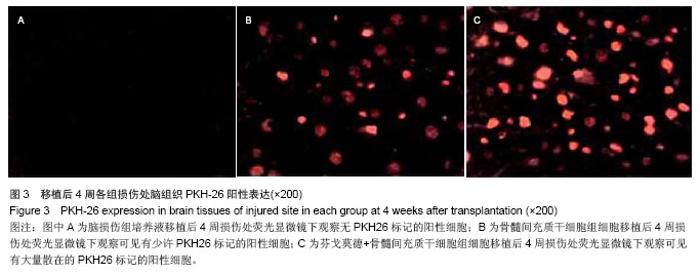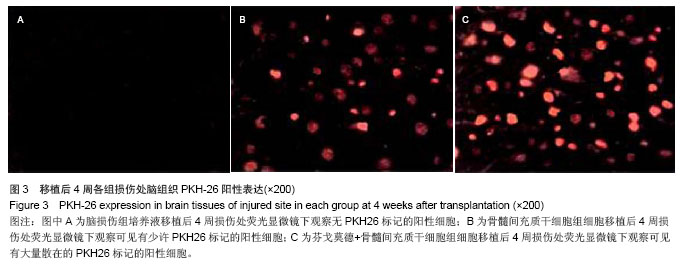| [1]Klose MC, Juul A, Poulsgaard L,et al.Pituitary insufficiency following head trauma.Ugeskr Laeger. 2007;169(3):211-213.
[2]胡静.中西医结合护理在颅脑损伤并发麻痹性肠梗阻中的应用[J].甘肃高师学报,2013,18(2):54-55.
[3]谢鹃,吴艳辉,王丽华.丙泊酚靶控输注对重型颅脑损伤患者围手术期血浆CRP、IL-6和TNF-α的影响[J].放射免疫学杂志,2013, 26(4):526-528.
[4]潘锋,李娜,卢旺盛.两岁以下婴幼儿重型颅脑损伤的临床特点与治疗[J].解剖与临床,2013,18(2):146-148.
[5]Protheroe RT, Gwinnutt CL.Early hospital care of severe traumatic brain injury.Anaesthesia. 2011;66(11):1035-1047.
[6]Ahmed Z, Dent RG, Suggate EL,et al.Disinhibition of neurotrophin-induced dorsal root ganglion cell neurite outgrowth on CNS myelin by siRNA-mediated knockdown of NgR, p75NTR and Rho-A.Mol Cell Neurosci. 2005;28(3): 509-523.
[7]孙思鑫,曹晓建,汪雷,等.FTY720与他克莫司对脊髓损伤有显著疗效[J].南京医科大学学报:自然科学版,2008,28(1):20-23,36.
[8]王求永,刘文革,王振宇.FTY720对大鼠急性脊髓损伤后RhoA表达的影响[J].中国骨科临床与基础研究杂志,2010,2(4):292-296.
[9]周国庆,金怡,张鹏.沉默RhoA基因对骨髓间充质干细胞静脉移植治疗脑梗死大鼠的作用[J].中国组织工程研究与临床康复, 2011,14(45):8416-8420.
[10]Li L, Ding J, Marshall C,et al.Pretraining affects Morris water maze performance with different patterns between control and ovariectomized plus D-galactose-injected mice.Behav Brain Res. 2011;217(1):244-247.
[11]Grigorian AS, Gilerovich EG, Pavlichenko NN,et al.Effect of transplantation of mesenchymal stem cells on neuronal survival and formation of a glial scar in the brain of rats with severe traumatic brain injury.Bull Exp Biol Med. 2011;150(4): 551-555.
[12]Titomanlio L, Kavelaars A, Dalous J,et al.Stem cell therapy for neonatal brain injury: perspectives and challenges.Ann Neurol. 2011;70(5):698-712.
[13]Jones GL, Juszczak MT, Hughes SJ,et al.An improved method of fluorescent dual insulin and endothelial staining allows visualisation of the revascularisation of intraportally transplanted islets.Transplant Proc. 2005;37(8):3509-3511.
[14]何志旭,严虎,刘俊峰,等.骨髓间充质干细胞移植治疗缺血再灌注脑损伤[J].中华实用儿科临床杂志,2013,28(6):435-439.
[15]王斌,刘茹,陈春芳,等.血管内皮生长因子基因转染骨髓间充质干细胞对支气管肺发育不良大鼠肺发育的影响[J].中华实用儿科临床杂志,2013,28(2):102-106.
[16]吕洋,王海萍,刘博,等.转化生长因子β1诱导骨髓间充质干细胞分化为心肌样细胞的作用[J].解剖学报,2013,44(1):49-54.
[17]都凌杰,李冉,赵曼曼,等.骨髓间充质干细胞对大鼠硅沉着病纤维化形成的影响[J].解剖学报,2013,44(1):62-67.
[18]李阳,房艳,柏树令,等.纳米“羟基磷灰石-胶原蛋白-壳聚糖”材料复合骨髓间充质干细胞修复小鼠胫骨缺损[J].解剖学报,2013, 44(3):386-392.
[19]黄晓丹,吕辉珍,靳思思,等.雷奈酸锶通过TGF-β1/Smad通路促进骨髓间充质干细胞向成骨细胞分化[J].中国病理生理杂志, 2013,29(2):302-307.
[20]莫世静,童秀珍,钟茜,等.骨髓间充质干细胞通过上调EPO表达减轻缺氧损伤引起的PC12细胞凋亡[J].中国病理生理杂志,2013, 29(1):62-69.
[21]吴新环,黄花荣,钟英强,等.骨髓间充质干细胞、肿瘤坏死因子受体Ⅱ-抗体融合蛋白和美沙拉嗪对TNBS诱导的结肠炎大鼠疾病活动指数与组织损伤指数的影响[J].中国病理生理杂志,2013, 29(5):784-789.
[22]吴志勇,漆红梅,罗骏,等.骨髓间充质干细胞移植对心衰大鼠心肌组织中MMP-2、MMP-9和TIMP-1的影响[J].中国病理生理杂志, 2013,29(6):975-981.
[23]何丁文,殷嫦嫦,顾玉荣,等.bFGF和EGF诱导大鼠骨髓间充质干细胞分化成神经样细胞[J].基础医学与临床,2013,33(4): 444-449.
[24]Ha Y, Choi JU, Yoon DH,et al.Neural phenotype expression of cultured human cord blood cells in vitro.Neuroreport. 2001; 12(16):3523-3527.
[25]张艳丽,钟部帅,樊懿萱,等.山羊DAZL基因的克隆及在山羊骨髓间充质干细胞中的表达[J].南京农业大学学报,2012,35(6): 104-110.
[26]吕婧玉,和小娥,张志平,等.红细胞裂解法及不同培养条件对兔骨髓间充质干细胞体外增殖的影响[J].江西农业学报,2012(11): 132-135.
[27]和小娥,任卫青,邓立新,等.生长因子对兔骨髓间充质干细胞增殖的影响[J].畜牧兽医学报,2012,43(4):553-557.
[28]宋少康,董雅娟,柏学进,等.利用RNAi抑制牛骨髓间充质干细胞中朊蛋白基因(PRNP)的表达[J].中国兽医学报,2012,32(11): 1683-1688.
[29]户小伟,劳山.氯化锂对兔骨髓间充质干细胞增殖影响[J].蛇志, 2012,24(2):108-110.
[30]何丁文,徐艳杰,廖新根,等.自组装多肽纳米纤维支架诱导骨髓间充质干细胞定向分化[J].中国生物工程杂志,2012,32(2):100- 106.
[31]李晓娜,宋关斌,罗庆.机械拉伸对骨髓间充质干细胞迁移行为的影响[J].中国生物工程杂志,2012,32(5):1-6.
[32]王海久,任利,汪庚申,等.骨髓间充质干细胞(BMSCs)移植于大鼠肝硬化模型的动物实验研究[J].现代生物医学进展,2012, 12(1): 46-48.
[33]谢娟,王宗仁,宋铁兵,等.芪丹通脉片促进骨髓间充质干细胞向缺血心肌趋化迁移[J].现代生物医学进展,2012,12(9):1613-1617.
[34]王丽雅,廖学娟,郑晓辉,等.Wnt信号通路与骨髓间充质干细胞成骨之间的关系[J].现代生物医学进展,2012,12(20):3981-3984.
[35]Buzańska L, Jurga M, Domańska-Janik K.Neuronal differentiation of human umbilical cord blood neural stem-like cell line.Neurodegener Dis. 2006;3(1-2):19-26.
[36]Neuhoff S, Moers J, Rieks M, et al.Proliferation, differentiation, and cytokine secretion of human umbilical cord blood-derived mononuclear cells in vitro.Exp Hematol. 2007;35(7):1119- 1131.
[37]王东,张建军,马景鑑.神经干细胞NgR基因沉默立体定向移植治疗大鼠脑损伤[J].中国组织工程研究与临床康复,2010, 14(14): 2539-2544.
[38]杨平林,贺西京,李浩鹏,等.成年大鼠脊髓损伤后反应性星形胶质细胞增生和巢蛋白表达的相关性及意义[J].南方医科大学学报, 2008,28(10):1752-1755.
[39]王成科,唐开.免疫抑制剂治疗脊髓损伤的研究进展[J].中国脊柱脊髓杂志,2011,21(7):606-609.
[40]Miron VE, Hall JA, Kennedy TE,et al.Cyclical and dose-dependent responses of adult human mature oligodendrocytes to fingolimod.Am J Pathol. 2008;173(4): 1143-1152.
[41]赵玉娜,邢爱敏.多发性硬化症治疗药芬戈莫德[J].药学进展, 2010, 34(12):574-575.
[42]刘春苗,谭利明.芬戈莫德对EAE大鼠的防治作用及对BAX在脑组织中表达的影响[J].现代预防医学,2012,39(11):2837-2840.
[43]郑明克,侯春梅,张仁文,等.芬戈莫德对小鼠皮肤胶原沉着病的治疗作用及可能机制[J].国际药学研究杂志,2013,40(3):318-322. |
